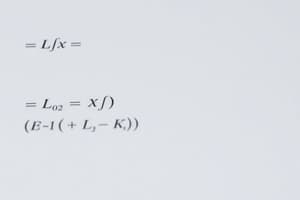Podcast
Questions and Answers
What is the limit as $x$ approaches $-\infty$ for the expression $\frac{x^2 - 5t - 9}{2x^4 + 3x^3}$?
What is the limit as $x$ approaches $-\infty$ for the expression $\frac{x^2 - 5t - 9}{2x^4 + 3x^3}$?
- 0
- 1
- 4 (correct)
- 2
Which derivative represents $f(x) = 2x^2 - 16x + 35$ using the first principle?
Which derivative represents $f(x) = 2x^2 - 16x + 35$ using the first principle?
- x + 16
- 3x - 5
- 2x - 8
- 4x - 16 (correct)
What is the derivative of $y = 3\sqrt{x^2}(2x - x^2)$ with respect to $x$?
What is the derivative of $y = 3\sqrt{x^2}(2x - x^2)$ with respect to $x$?
- 5x^{2/3} + 4x^{5/3}
- 10x^{2/3} - 8x^{5/3}
- 5x^{2/3} - 4x^{5/3} (correct)
- 10x^{2/3} + 8x^{5/3}
Evaluate the limit as $t$ approaches 4 for $\frac{t - \sqrt{3 + 4}}{4 - t}$.
Evaluate the limit as $t$ approaches 4 for $\frac{t - \sqrt{3 + 4}}{4 - t}$.
What is the third derivative $\frac{d^4y}{dx^4}$ when given $y(x) = x^4 - 4x^3 + 3x^2 - 5x$?
What is the third derivative $\frac{d^4y}{dx^4}$ when given $y(x) = x^4 - 4x^3 + 3x^2 - 5x$?
Evaluate the limit as $x$ approaches infinity for the expression $lim_{x→∞} (2x^4−x^2+8x−5x^4+7)$.
Evaluate the limit as $x$ approaches infinity for the expression $lim_{x→∞} (2x^4−x^2+8x−5x^4+7)$.
What is the result of differentiating $f(x) = (ax^3 + bx)$ with respect to $x$?
What is the result of differentiating $f(x) = (ax^3 + bx)$ with respect to $x$?
Evaluate the limit as $x$ approaches negative infinity for the expression $lim_{x→−∞} (x^2−5t−9)/(2x^4+3x^3)$.
Evaluate the limit as $x$ approaches negative infinity for the expression $lim_{x→−∞} (x^2−5t−9)/(2x^4+3x^3)$.
Given $y(x) = x^4 - 4x^3 + 3x^2 - 5x$, what is the evaluated expression for $4y$ with respect to $x$?
Given $y(x) = x^4 - 4x^3 + 3x^2 - 5x$, what is the evaluated expression for $4y$ with respect to $x$?
What is the result of integrating the expression $∫(x^3 + 3x^2 + 2x + 4)$?
What is the result of integrating the expression $∫(x^3 + 3x^2 + 2x + 4)$?
Flashcards are hidden until you start studying
Study Notes
Limit Evaluations
- Limit as x approaches negative infinity for
(x² - 5t - 9) / (2x⁴ + 3x³)evaluates to 4. - Limit as x approaches infinity for
(6e^(4x) - e^(-2x)) / (8e^(4x) - e^(2x) + 3e^(-x))evaluates to 3/4. - Limit as h approaches zero for
(−3 + h)² - 18hevaluates to 12. - Limit as t approaches 4 for
(t - √(3 + 4)) / (4 - t)evaluates to -3/8.
Derivative Calculations
- Derivative of the function
f(x) = 2x² - 16x + 35using the first principle results in4x - 16. - Derivative of
f(x) = (ax³ + bx)is3ax² + b. - Given
y(x) = x⁴ - 4x³ + 3x² - 5x, the fourth derivative evaluated yields 24. - Explore differentiation with respect to a function involving roots and products, e.g.,
y = 3√(x²)(2x - x²)givesy' = 5x³ + 4x³.
Integral Calculations
- Integral of the polynomial function
∫(x³ + 3x² + 2x + 4)dxyieldsx⁴/4 + x³ + x² + 4x + c. - Evaluate
∫e^(4x)dx, which evaluates toe^(4x)/4 + c. - Find the integral of
sec³(x) tan(x)dx, results show it leads to some trigonometric transformations. - The volume of a sphere derived from the semicircle
y = √(r² - x²)revolving about the x-axis is calculated to be4πr³/3.
Additional Limit Evaluations
- Limit as x approaches infinity for
(2x⁴ - x² + 8x - 5x⁴ + 7)evaluates to 1/2. - Confirm limits and derivatives repeatedly to ensure proficiency.
Practice Application
- Several questions and problems emphasize key calculus concepts including limits, differentiation, and integration in straightforward manners.
- Use provided answers to self-assess understanding and problem-solving capabilities related to calculus.
Conclusion
- Solidify understanding and computation skills in central calculus topics through repeated practice and evaluation of limits, derivatives, and integrative functions.
Studying That Suits You
Use AI to generate personalized quizzes and flashcards to suit your learning preferences.




